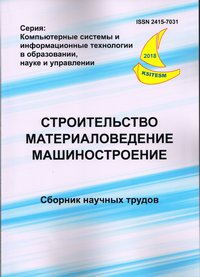Improvement of the estimations of solutions in the semidefinite programmin
DOI:
https://doi.org/10.30838/P.CMM.2415.270818.68.232Keywords:
complex systems, semidefinite relaxation, quadratic problems, primer-dual interior point method, modification of semidefinite programming problems.Abstract
Purpose. We develop new methods for solving optimization models of complex systems. Such models arise in technology, artificial intelligence, design, construction and management of complex systems. Solving such optimization problems is a complex computational problem. This problem is to develop effective methods for solving such classes. Methodology. In this paper, we propose to transform the classes of problems to problems of semidefinite programming and to use their solutions for primer-dual interior point methods. We propose an iterative procedure for modifying the corresponding problem of semidefinite programming, which makes it possible to find exact solutions of the original problem. Findings. To solve the problems of quadratic optimization, semi-definite relaxation and a direct-dual method of the interior point are used. An iterative procedure for modifying semidefinite programming problems is constructed, which makes it possible to obtain an exact solution of the original problem. The obtained results are confirmed by numerical experiments. Originality. A new methodology for solving complex optimization problems that arise in modeling complex systems using semidefinite relaxation is developed. A sequential modification of the problems of semidefinite optimization is proposed. Practical value. We considered technique for solving complex quadratic optimization problems is realized in the form of software. Comparative experiments confirm the effectiveness of this technique in solving classes of problems of quadratic optimization.References
Kosolap A.I. Metody globalnoy optimizatsii [Methods of global optimization]. Dnipropetrovsk, Nauka i obrazovanie Publ., 2013, 316 p. (in Russian).
Kosolap A.I. and Peretiatko A.S. Poluopredelennoe programmirovanie i ego prilozheniya [Semidefinite programming and its applications]. Dnepr, PGASA, 2018, 148 p. (in Russian).
Dur M. Duality in Global Optimization: Optimality Conditions and Algorithmical Aspects /M. Dur. – Shaker Verlag, 1999, – 117 p.
Floudas, C.A. Deterministic global optimization: theory, algorithms and applications. Kluwer Academic Publishers, 2000, 57 p.
Floudas, С.A. and Gounaris C.E. A review of recent advances in global optimization. J. Glob. Optim., 2009, v. 45, no. 1. pp. 3–38.
Horst, R. and Tuy H. Global Optimization: Deterministic Approaches. 3rd ed., Berlin, Springer–Verlag, 1996, 727 p.
Kenneth, V.P., Storn R.M. and Lampinen J.A. Differential Evolution. A Practical Approach to Global Optimization. Berlin Heidelberg, Springer-Verlag, 2005, 542 p.
Nocedal, J. and Wright S. J. Numerical optimization. Springer, 2006, 685 p.
Sherali H. D. and Adams W. P. A Reformulation-Linearization Technique for Solving Discrete and Continuous Nonconvex Problems. Springer Publ., 2010, 518 p.
Ye Y. Semidefinite programming. Stanford, Stanford University, 2003, 161 p.
Downloads
Published
Issue
Section
License
Редакція Видання категорично засуджує прояви плагіату в статтях та вживає всіх можливих заходів для його недопущення. Плагіат розглядається як форма порушення авторських прав і наукової етики.
При виявлені у статті більш ніж 25% запозиченого тексту без відповідних посилань та використання лапок, стаття кваліфікується як така, що містить плагіат. У цьому випадку стаття більше не розглядається редакцією, а автор отримує перше попередження.
Автори, в статтях яких повторно виявлено плагіат, не зможуть публікуватися в усіх журналах Видавництва ДВНЗ «Придніпровська державна академія будівництва та архітектури».
Автори, які публікуються у цьому журналі, погоджуються з наступними умовами:
- Автори залишають за собою право на авторство своєї роботи та передають журналу право першої публікації цієї роботи на умовах ліцензії Creative Commons Attribution License, котра дозволяє іншим особам вільно розповсюджувати опубліковану роботу з обов'язковим посиланням на авторів оригінальної роботи та першу публікацію роботи у цьому журналі.
- Автори мають право укладати самостійні додаткові угоди щодо неексклюзивного розповсюдження роботи у тому вигляді, в якому вона була опублікована цим журналом (наприклад, розміщувати роботу в електронному сховищі установи або публікувати у складі монографії), за умови збереження посилання на першу публікацію роботи у цьому журналі.
- Політика журналу дозволяє і заохочує розміщення авторами в мережі Інтернет (наприклад, у сховищах установ або на особистих веб-сайтах) рукопису роботи, як до подання цього рукопису до редакції, так і під час його редакційного опрацювання, оскільки це сприяє виникненню продуктивної наукової дискусії та позитивно позначається на оперативності та динаміці цитування опублікованої роботи (див. The Effect of Open Access).

